- Home
- Rabindranath Tagore
The Land of Cards: Stories, Poems, and Plays for Children Page 4
The Land of Cards: Stories, Poems, and Plays for Children Read online
Page 4
Amal:The king has appointed him Morol, I suppose.
Prahari:Arre, no. He has assumed the Morol’s role himself. He creates such problems for anyone who resists his authority that everyone is afraid of him. He runs his trade solely on the strength of his enmity with everyone. I’ll be off now; I’ve been neglecting my duty. I’ll come again tomorrow morning, to give you news about the entire town.
Exit
Amal:If I received a daily letter from the king, how nice it would be . . . Let me sit by that window. But I can’t read! Who will read the letters to me? Pishima reads the Ramayana after all. Can she read the king’s handwriting? If no one can read the letters, I’ll store them up, to read when I’m grown-up. But what if the postman doesn’t recognize me! . . . Morolmoshai, O Morolmoshai—please come here once, I have something to say.
Morol:Who’s that re! Calling me while I’m out in the street! Where has this monkey appeared from?
Amal:You are Morolmoshai, after all: everyone respects you.
Morol(delighted): Yes, yes, indeed they respect me. They respect me a great deal.
Amal:Does the royal postman obey your commands?
Morol:Could he survive if he didn’t? Bas re! Heaven forbid, would he dare!
Amal:You must tell the postman that I am the one named Amal—the one who sits waiting at this window.
Morol:Why, may I ask?
Amal:What if a letter arrives in my name . . .
Morol:A letter in your name! Who would write to you?
Amal:If the king writes to me, then . . .
Morol:Ha ha ha ha! This boy is quite something. Ha ha ha ha! The king write to you! That he will, indeed! You are his best friend after all! The king is wasting away, I’m told, for not having met you these last few days. It won’t be long; the letter might arrive this very day, or maybe tomorrow.
Amal:Morolmoshai, why do you speak like that! Are you angry with me?
Morol:Bas re! Heaven forbid! Angry with you? Would I dare! When the king himself corresponds with you! . . . Madhabdatta has grown too big for his boots, I see. Just because he’s saved some money, they only talk of kings and emperors in his home, these days. Wait and see, I’ll teach him a lesson . . . Listen, you young fellow, I’ll see to it that the king’s letter arrives at your doorstep soon.
Amal:No, no, you need not do anything.
Morol:Why? I’ll tell the king about you—then he can’t delay any longer—he’ll send a paik right away to find out how you all are faring . . . No, Madhabdatta is far too audacious—if this reaches the king’s ears, he will be taught a lesson.
Exit
Amal:Who are you, walking by with anklets tinkling? Please stop for a moment, bhai!
Enter young girl
Girl:As if I can afford to stop! Time is short after all.
Amal:You don’t want to stop—I don’t want to sit here any more, either.
Girl:You look like a fading star at dawn—tell me, what’s the matter with you?
Amal:I don’t know what’s wrong with me. The Kobiraj has forbidden me to step out.
Girl:Aha, then don’t go out—one must obey the Kobiraj—one mustn’t be unruly, or they’ll say one is naughty. Gazing at the outside world makes your soul restless; let me half-close this door of yours then.
Amal:No, no, don’t close it—everything is closed for me here; there is only this little opening. Tell me, who are you? I don’t recognize you!
Girl:I am Sudha.
Amal:Sudha?
Sudha:Don’t you know? I’m the daughter of the malini, the woman who makes garlands here.
Amal:What do you do?
Sudha:I pluck a basketful of flowers and string garlands with them. I’m on my way to gather flowers now.
Amal:Going to gather flowers? That’s why your feet are so happy, your anklets tinkling as you walk—jhum jhum jhum. If I could go with you, I’d pluck you flowers from the higher branches, where they remain out of sight.
Sudha:Is that so! As if you know more about flowers than I do!
Amal:I do, I do, I know only too well. I know about saat bhai champa, the seven magnolia-blossom brothers. I feel, if only everyone would set me free, I could go away—inside the very dense forest where the path can’t be seen. On the tips of the frailest boughs where tiny hummingbirds perch, I can blossom as a champa. Will you be my Paruldidi—my elder sister the trumpet flower?
Sudha:What a harebrained idea! How can I be Paruldidi? I’m Sudha after all—the daughter of malini Shashi. Every day I must thread so many garlands . . . If I could sit idle here like you, what fun it would be!
Amal:What would you do all day, then?
Sudha:I have a Benebou doll; I’d arrange her wedding. I have a kitten; with her I’d . . . Let me be off, time is getting on. If it grows late there won’t be any flowers to be found.
Amal:Talk to me a little longer, please. I am really enjoying it.
Sudha:Achchha, very well, don’t be up to any mischief. Be a good boy and sit here quietly. On my way back from flower-gathering, I’ll come and chat with you.
Amal:And will you give me a flower when you go?
Sudha:How can I give you a flower just like that? It must be paid for, after all.
Amal:When I grow up I’ll pay you the price for it. I’ll go in search of work, away beyond that waterfall; then I’ll come and pay you the price.
Sudha:Achchha, very well.
Amal:So you will come after you have gathered the flowers?
Sudha:I will.
Amal:You will?
Sudha:I will.
Amal:You won’t forget me? My name is Amal. Will you remember?
Sudha:No, I won’t forget. Wait and see, I will remember.
Exit
Enter group of boys
Amal:Bhai, where are you all off to, bhai? Stop here once, just for a little while, please.
Boys:We are going to play.
Amal:What will you play, bhai?
Boys:We will play farmers.
1st Boy(displaying a stave): Here is our plough.
2nd Boy:The two of us will be cows.
Amal:Will you play all day?
Boys:Yes a-l-l day.
Amal:And after that, will you return home at dusk, walking along the river’s edge?
Boys:Yes, we’ll return at dusk.
Amal:Please pass by this room of mine on your way back, bhai.
Boys:Come out! Let’s go and play.
Amal:The Kobiraj has forbidden me to go out.
Boys:Kobiraj! Do you mean to say you obey him when he forbids you!—Come bhai, let’s go, we’re getting late.
Amal:No bhai, please pause awhile in the street, to play outside this window of mine—let me spend some time watching you.
Boys:What shall we play with here!
Amal:Here are all my unused toys, lying about—take all of them, bhai. It’s no fun playing alone indoors—these just lie around, gathering dust—they are of no use to me.
Boys:Wah, wah, wah, what wonderful toys! This is a ship! And this, a jataiburi! Do you see this, bhai? What a marvellous soldier! You’re giving away all these things to us? Aren’t you sorry to part with them?
Amal:No, not at all. I give all these things to you.
Boys:But we shan’t return them.
Amal:No, you need not return them.
Boys:Nobody will scold us, will they?
Amal:Nobody, nobody at all. But every morning, you must play with these toys outside this door of mine, for a while. And when these grow stale, I’ll again send for new toys for you.
Boys:Very well bhai, we’ll come by every day to play here. O bhai, arrange all the soliders here—let’s play war. Where shall we get guns? There’s that enormous sharkathi, that feathery reed lying there—let’s break it into pieces to use as guns. But you are dozing off, bhai!
Amal:Yes, I’m getting very drowsy. I don’t know why I feel sleepy every now and then. I’ve been sitting up for a long while; I can’t any more—my back aches.
Amal:Yes, there it goes, ding-dong ding-dong—calling me to sleep.
Boys:We’ll be off then. We’ll be back tomorrow morning.
Amal:Before you go, let me ask you something, bhai! You remain outdoors after all: do you know the postmen from that royal post office?
Boys:Yes, we know them indeed. We know them well.
Amal:Who are they, what are their names?
Boys:One is Badal Harkara, the Cloud Messenger; another is called Sharat, for early autumn. There are so many others.
Amal:Achchha, if a letter arrives for me, will they identify me?
Boys:Why not? If the letter bears your name, they will surely recognize you.
Amal:When you come tomorrow, call one of them and introduce him to me, please.
Boys:Achchha, we will.
3
Amal:Pishemoshai, can’t I even go to that window of mine today? Has the Kobiraj forbidden it?
Madhabdatta:Yes baba. It’s sitting there every day that has aggravated your illness.
Amal:No, Pishemoshai, no . . . I know nothing about my illness, but when I’m there I feel very well.
Madhabdatta:Sitting there, you have made friends with all the townsfolk, young and old—there seems to be a big fair at my doorstep every day. Can your health withstand that! Just see how pale your face has become today.
Amal:Pishemoshai, that fakir of mine might go away if he doesn’t see me at the window.
Madhabdatta:Who is this fakir of yours?
Amal:He’s the one who comes to me every day with stories of many different lands. I enjoy listening to them.
Madhabdatta:But I don’t know any fakir.
Amal:This is exactly when he comes—I beg you, please go and tell him once that he should visit my room.
Enter Thakurda, disguised as a fakir
Amal:O fakir! Here, listen to me! Come here, come to my bed.
Madhabdatta:What! But it’s . . .
Thakurda(winking meaningfully): I am a fakir.
Madhabdatta:I cannot think of anything that you are not.
Amal:Where did you go this time, fakir?
Thakurda:I went to Stork Island—I’ve just returned from that very place.
Madhabdatta:To Stork Island?
Thakurda:Why should that surprise you? Do you think I’m like the rest of you? It costs me nothing to travel there, after all. I can go wherever I please.
Amal(clapping his hands): What fun it must be for you! When I get well, you’ll make me your disciple. Do you remember your promise, fakir?
Thakurda:I remember only too well. I’ll teach you such mantras for travel that sea, mountain, forests, nothing can ever stop you anywhere.
Madhabdatta:What sort of crazy talk is this, you two!
Thakurda:Baba Amal, I do not fear mountains, hills and oceans—but if the Kobiraj arrives to join this Pishemoshai of yours, my mantra will have to concede defeat.
Amal:No, no, Pishemoshai, don’t tell the Kobiraj anything. I shall lie right here for now, without doing anything at all; but the day I get well, I’ll become the fakir’s disciple and go away. Rivers, mountains and seas can no longer hold me back then.
Madhabdatta:Chhi, for shame, baba, one shouldn’t keep talking of going away like that. Hearing you, I begin to feel strangely melancholy.
Amal:What sort of place is Stork Island? Please tell me, O fakir!
Thakurda:It’s an extraordinary place. The land of birds—no humans live there. They don’t talk, or walk: they sing and fly.
Amal:Ah, how wonderful! Is it on the seashore?
Thakurda:On the seashore, indeed.
Amal:Are all the mountains blue?
Thakurda:It’s in the blue mountains that they build their nests. At dusk, the rays of the setting sun fall upon those mountains, and flocks of green birds fly homewards. The hues of that sky, those birds, those mountains—what a dramatic spectacle!
Amal:Are there waterfalls in those mountains?
Thakurda:Plenty of them! Can we do without waterfalls? They’re like a downpour of melting diamonds. And how the waters dance! Babbling ceaselessly, making the pebbles clink against each other, the waterfall gushes forth and plunges into the ocean. It is beyond the powers of any Kobiraj to arrest its flow for a single hour. If the birds didn’t exclude me as an utterly worthless human being, I’d build my nest at the waterfall’s edge, beside those thousands of bird-nests, and spend my entire day watching the waves in the sea.
Amal:If I were a bird . . .
Thakurda:Then there would be a great problem. I hear you’ve given the Dahiwala your word that when you grow up you will sell dahi—but in the world of birds, your trade in dahi wouldn’t thrive too well. In fact, you’d probably incur some losses.
Madhabdatta:This is too much for me. You’ll drive me crazy too, it seems. I’ll be off.
Amal:Pishemoshai, has my Dahiwala come and gone?
Madhabdatta:He has, indeed! He can’t make a living after all from carrying the baggage of that favourite fakir of yours, to fly around among the bird-nests of Stork Island. He has left a pot of dahi for you, and a message that it’s his bonjhi’s wedding in the village—so he’s off to Kolmipara to place an order for flutes. That’s why he’s very busy.
Amal:But he had said he’d marry his sister’s youngest daughter, his little bonjhi, to me.
Thakurda:Then it’s a serious problem, I can see.
Amal:He’d said she’d be my lovely bride—dressed in a striped red sari, a nolok dangling from her nose. In the morning, she would milk the black cow with her own hands and feed me the foaming milk in a fresh earthen pot, and at dusk, she would shine the prayer lamp in the cowshed and then settle close to me, to tell the story of saat bhai champa.
Thakurda:Wah, wah, a fine wife indeed! Even I feel tempted, fakir though I am. Baba, don’t worry. Let the wedding take place this time. I assure you there will be no lack of bonjhis in his house, if you ever feel the need.
Madhabdatta:Go on then! I can’t take this any more.
Exit
Amal:Pishemoshai has gone, fakir—now please tell me quietly, has a letter from the king arrived at the post office, in my name?
Thakurda:I have heard, indeed, that his letter has been issued. It’s still on the way.
Amal:On the way? Which way? Is it the way through the dense forests, which can be seen far, far away when the sky clears after a shower of rain?
Thakurda:Then you know everything, I can see—that is the way, indeed it is.
Amal:I know everything, fakir!
Thakurda:So I can see—but how did you know?
Amal:That I don’t know. I seem to see before my very eyes . . . I feel I’ve seen it many times, long ago; I can’t remember how long. Shall I tell you about it? I can see the royal postman descending alone from the mountaintop, without pause—lantern in hand, mailbag on his shoulder! For so many days—so many nights—he has been descending, without pause. At the foot of the mountain where the waterfall ends its descent, he takes the route of the winding river and advances without pause . . . At the river’s edge is a field of jowar, and down the narrow path that cuts through it, he keeps advancing . . . and after that the field of sugar cane, a high ridge along its side, and along the top of that ridge he keeps on advancing . . . night and day, all alone, he advances . . . crickets chirping in the fields . . . not a soul to be seen beside the river, just a long-billed snipe wandering there, swaying its tail . . . I see it all. The closer he approaches the more delighted I feel, inwardly.
Thakurda:My eyes are not so young, of course, but still, I can see this vision through your eyes.
Amal:Achchha, fakir, do you know the king who owns this post office?
Thakurda:Indeed I do. I go to him every day for alms, after all.
Amal:How wonderful! When I get well, I too shall go to him to beg for alms. Can’t I go to him?
&n
bsp; Thakurda:Baba, you will have no need to beg for alms. He will grant you his gift unasked.
Amal:No, no, I shall stand by the wayside, before his door, and beg for alms, calling ‘Jai ho!’ I’ll dance to the rhythm of the tabor, my khanjani—that’ll be good, won’t it?

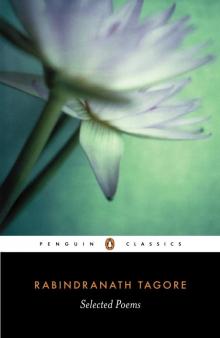 Selected Poems
Selected Poems The Lover of God
The Lover of God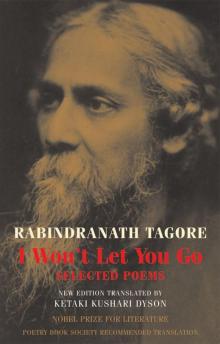 I Won't Let You Go: Selected Poems
I Won't Let You Go: Selected Poems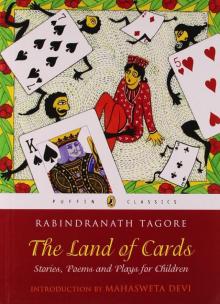 The Land of Cards: Stories, Poems, and Plays for Children
The Land of Cards: Stories, Poems, and Plays for Children The Tagore Omnibus, Volume One
The Tagore Omnibus, Volume One The Boat-wreck
The Boat-wreck Chokher Bali
Chokher Bali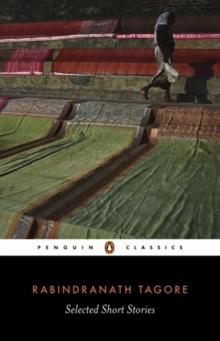 Selected Short Stories
Selected Short Stories He (Shey)
He (Shey) Letters From a Young Poet 1887 1895
Letters From a Young Poet 1887 1895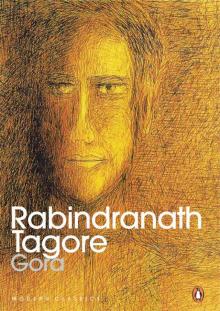 Gora
Gora Tagore Omnibus, Volume 1
Tagore Omnibus, Volume 1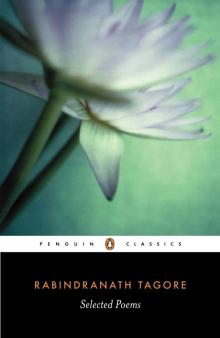 Selected Poems (Tagore, Rabindranath)
Selected Poems (Tagore, Rabindranath)